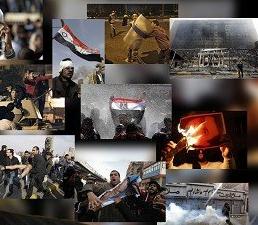Among many Arab and Western circles, there is a subtle conviction that Western countries and other major players are benefitting from the current instability across the Arab world and that this is the reason why the situation isn’t changing in the region.
Ebtesam Al-Ketbi, founder and president of the Emirates Policy Center in Abu Dhabi, expressed this concept clearly during her speech at a NATO conference on Arab geopolitics held this week.
But Nicola De Santis, Head of the Middle East and North Africa Section in the Political Affairs and Security Policy Division at NATO headquarters in Brussels, thinks otherwise.
“Nobody can benefit from this chaos because our securities are inextricably linked, so they affect each other,” said De Santis.
Today this has become more evident through the phenomenon of migrations from Africa and the Middle East that is affecting many Western countries, she added.
In 2016, over 360,000 migrants arrived by sea from North Africa to Italy, and over 134,000 just in the first 9 months of 2017, according to the International Organization for Migration’s data.
These figures represent a security challenge for Italy, showing that instability in the Arab world indeed does not bring any benefit for the European country.
Over 20 years ago, NATO established the Mediterranean Dialogue based on the idea that security in Europe is closely linked to security in the Mediterranean. For this reason, the Mediterranean Dialogue involves seven non-NATO-countries, including Arab States like Algeria, Jordan, Egypt, Tunisia and Morocco.
With more than 30 areas of cooperation, the aim of this initiative and of its Mediterranean Dialogue Work Program (MDWP) is to contribute towards regional security and stability through stronger practical cooperation, including contributing to the fight against terrorism and developing defense reforms.
“We should look at these over 20 years of cooperative security with the Arab world” said De Santis, explaining that cooperative security is the answer to pessimism, to the idea that the Middle East is somehow doomed by insecurity, instability, conflict and poverty.
“Today I see people with which we built a security community. When we go to these countries, from Egypt, to Tunisia, Algeria, we have inter-ministerial committees that sit down with us to find together how to upgrade our cooperation, we assess together. This is something extraordinary. This is cooperative security at a practical level,” said De Santis.
While 85 percent of the MDWP activities are essentially military, the Program comprises cooperation in other areas like civil emergency planning and crisis management.
“If it’s true that we share common security challenges and threats, we do share something more important, which are the common aspirations to peace, security and stability to the benefit of our people,” De Santis concluded.
Criminalizing militias
Also discussed on the sidelines of the NATO conference was the idea of criminalizing militias to support the fight against terrorism.
“Militias are [a form of] official terrorism supported by a state. This is why it should be criminalized,” Mustafa Alani, Director of the National Security and Terrorism Studies Department at the Gulf Research Center in Jeddah told Al Arabiya English.
“If you don’t fight the militia, you won’t defeat terrorism. You can’t deal only with one component,” Alani added.
The main concern is now also related to the fact that in recent years some militia organizations have become stronger and more heavily armed than some governments.
“In Lebanon, Hezbollah is ten times stronger than the Lebanese army, so we have a state within the state, stronger than the state. The militia will never allow a state to grow strong because a strong state wouldn’t allow militia,” Alani said.
As reported by The New York Times, Hezbollah has expanded its operations, becoming “active in so many places and against so many enemies that detractors have mocked it as ‘the Blackwater of Iran,’ after the infamous American mercenary firm.”
Alani believes that the international community should put in place measures to criminalize militias in order to combat terrorism. “Any country supporting militias should be punished, and the area occupied by the militia should face military action” said Alani.
In 1997, the US State Department designated Hezbollah as a Foreign Terrorist Organization (FTO). As stated by the US State Department, “FTO designations play a critical role in our fight against terrorism and are an effective means of curtailing support for terrorist activities and pressuring groups to get out of the terrorism business.”
Hezbollah’s Armed Wing is also in the European Union list of groups subject to specific measures to combat terrorism, as reported in the EU Council decision published this August.







































admin in: How the Muslim Brotherhood betrayed Saudi Arabia?
Great article with insight ...
https://www.viagrapascherfr.com/achat-sildenafil-pfizer-tarif/ in: Cross-region cooperation between anti-terrorism agencies needed
Hello there, just became aware of your blog through Google, and found ...